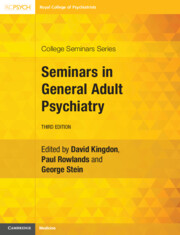Book contents
- Seminars in General Adult Psychiatry
- College Seminars Series
- Seminars in General Adult Psychiatry
- Copyright page
- Reviews
- Contents
- Contributors
- Introduction
- Chapter 1 Clinical Epidemiology
- Chapter 2 Assessment, Formulation and Diagnosis
- Chapter 3.1 Clinical Features of Depressive Disorders
- Chapter 3.2 Causes of Depression
- Chapter 3.3 Drug and Physical Treatments of Depression
- Chapter 3.4 Psychological and Social Treatment of Depression
- Chapter 4.1 Bipolar Disorder
- Chapter 4.2 Bipolar Disorder
- Chapter 5.1 Schizophrenia and Other Primary Psychoses
- Chapter 5.2 Causes and Outcome of Psychosis
- Chapter 5.3 Drug Treatment of the Psychoses
- Chapter 5.4 Psychosocial Management of Psychosis
- Chapter 6.1 Anxiety Disorders
- Chapter 6.2 Post-traumatic Stress Disorder
- Chapter 6.3 Specific Phobias
- Chapter 6.4 Obsessive-Compulsive and Related Disorders
- Chapter 6.5 Functional Neurological Disorder
- Chapter 6.6 Bodily Distress Disorder, Chronic Pain and Factitious Disorders
- Chapter 7.1 Clinical Features and Implications of New Classification of Personality Disorders
- Chapter 7.2 Clinical Approaches to Personality Disorder (AKA Complex Emotional Needs)
- Chapter 7.3 Antisocial and Other Personality Disorders, Impulse Control Disorders, and Non-substance Addictive Disorders
- Chapter 8 Neuropsychiatric Disorders
- Chapter 9 Autism
- Chapter 10 Attention-Deficit/Hyperactivity Disorder
- Chapter 11 Sleep Disorders and Psychiatry
- Chapter 12 Eating Disorders
- Chapter 13 Perinatal Psychiatry
- Chapter 14 Substance Use Disorders
- Chapter 15 Suicide and Self Harm
- Chapter 16 Physical Health Care
- Chapter 17 Culture, Mental Health and Mental Illnesses
- Chapter 18 Psychiatry in Primary Care
- Chapter 19 Psychiatry in the General Hospital
- Chapter 20 Adult Mental Health Services
- Index
- References
Chapter 3.4 - Psychological and Social Treatment of Depression
Published online by Cambridge University Press: 04 April 2024
- Seminars in General Adult Psychiatry
- College Seminars Series
- Seminars in General Adult Psychiatry
- Copyright page
- Reviews
- Contents
- Contributors
- Introduction
- Chapter 1 Clinical Epidemiology
- Chapter 2 Assessment, Formulation and Diagnosis
- Chapter 3.1 Clinical Features of Depressive Disorders
- Chapter 3.2 Causes of Depression
- Chapter 3.3 Drug and Physical Treatments of Depression
- Chapter 3.4 Psychological and Social Treatment of Depression
- Chapter 4.1 Bipolar Disorder
- Chapter 4.2 Bipolar Disorder
- Chapter 5.1 Schizophrenia and Other Primary Psychoses
- Chapter 5.2 Causes and Outcome of Psychosis
- Chapter 5.3 Drug Treatment of the Psychoses
- Chapter 5.4 Psychosocial Management of Psychosis
- Chapter 6.1 Anxiety Disorders
- Chapter 6.2 Post-traumatic Stress Disorder
- Chapter 6.3 Specific Phobias
- Chapter 6.4 Obsessive-Compulsive and Related Disorders
- Chapter 6.5 Functional Neurological Disorder
- Chapter 6.6 Bodily Distress Disorder, Chronic Pain and Factitious Disorders
- Chapter 7.1 Clinical Features and Implications of New Classification of Personality Disorders
- Chapter 7.2 Clinical Approaches to Personality Disorder (AKA Complex Emotional Needs)
- Chapter 7.3 Antisocial and Other Personality Disorders, Impulse Control Disorders, and Non-substance Addictive Disorders
- Chapter 8 Neuropsychiatric Disorders
- Chapter 9 Autism
- Chapter 10 Attention-Deficit/Hyperactivity Disorder
- Chapter 11 Sleep Disorders and Psychiatry
- Chapter 12 Eating Disorders
- Chapter 13 Perinatal Psychiatry
- Chapter 14 Substance Use Disorders
- Chapter 15 Suicide and Self Harm
- Chapter 16 Physical Health Care
- Chapter 17 Culture, Mental Health and Mental Illnesses
- Chapter 18 Psychiatry in Primary Care
- Chapter 19 Psychiatry in the General Hospital
- Chapter 20 Adult Mental Health Services
- Index
- References
Summary
Psychosocial intervention, in its broadest sense, is a vital component in the management of all types of depression, from mild depressive reactions to psychotic episodes. Even if pharmacological therapy or ECT is the main treatment, the way in which the clinician assesses, engages the patient, gives information about the illness and its treatment, and provides support contributes significantly to a successful outcome. In addition to this basic level of supportive work, many patients will benefit from more structured forms of psychotherapy. This chapter will consider the psychological and social therapies available for depression and the evidence for their effectiveness. Some general principles of psychological management for the depressed patient will be described.
Keywords
- Type
- Chapter
- Information
- Seminars in General Adult Psychiatry , pp. 147 - 161Publisher: Cambridge University PressPrint publication year: 2024

